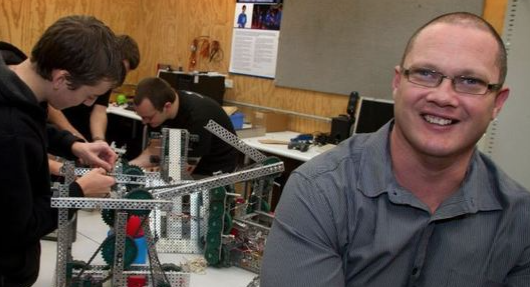For the first time young Kiwis can see tanglible prospects in the space industry, and Associate Professor Johan Potgieter reckons New Zealand’s future as a space nation looks bright.

Johan Potgieter is an associate professor in mechatronics, additive manufacturing and robotics.
New Zealand is on the verge of entering the space race. Auckland-based company Rocket Lab will launch its first test rocket from its site on the Mahia Peninsula by the end of the year; in another year it should be ready to make its first commercial flight.
When Rocket Lab begins taking satellites into orbit around Earth, it will be from the world's first privately-owned launch pad. But the government sees the potential too—as the newly-formed New Zealand space agency, which sits within the Ministry of Business, Innovation and Employment, shows.
So much of the hype around the 'space race' is about tourism, but taking people for space joyrides isn't the main opportunity for New Zealand. That rests with the technology and know-how that clusters around the launching of satellites and other materials into space.
The fact that we are seen as a small island in the south Pacific with some excellent niche capabilities is our unique selling point. We are smart, innovative people and the fact that we're far away from the rest of the world is now an advantage.
New Zealand is a good place to try things, a place where not everyone is watching.
Some large, commercial space engineering companies are looking very keenly at New Zealand for the testing and evaluating of products. We are a good option if you don't want to trial new space technologies in the United States around your competitors.
There is also no reason why New Zealand cannot establish itself as the 'Switzerland' of the space industry, a safe haven for launching security network infrastructure, for funelling big data and conducting scientific research. We could be the non-aggressive, non-military player whose space platforms are used for the betterment of mankind.
With the right investment and vision, I can see New Zealand becoming a cost-effective centre for space research: materials testing, atmospheric and environmental research, better weather and natural disaster predicting, building communications infrastructure, or simply improving our understanding of the conditions in space.
We could set up unmanned mini space labs for hire. Scientists could send small boxes up into space, with the ability to conduct experiments that are controlled and monitored from Earth. Suddenly, scientists will be able to test chemcial reactions in ways we have never done before in a zero-gravity environment.
Add to this a thriving space tourism industry and you can begin to see the value of this industry to New Zealand. This is not about sending people into space, but catering for the many space enthusiasts who will pay big money to be around the space industry and see a rocket launch.
New Zealand already has a very successful tourism industry, but this would attract a very different demographic: the high-tech tourist.
Wealthy, tech-savvy people from around the world will pay large sums of money for such a unique experience. And once you get those leading, tech entrepreneurs and engineers in the country, the opportunities multiply.
New Zealand already has a very successful tourism industry, but this would attract a different demographic: high-tech tourist.
Suddenly all sorts of connections are being made between international tech sector executives and local companies, entrepreneurs and scientists. That creates an ecosystem for the region, with New Zealand at its centre.
All this means, for the first time, Kiwi kids can consider going into the space industry as a viable career path. They see visionaries like Peter Beck from Rocket Labs reaching out for space - and it's not just a pipedream anymore.
Kids are already learning about rocketry in high school - during the last school holidays Massey University partnered with Kiwibots, KiwiSpace and Aerospace Education to run the Rocketry Boot Camp for Year 7 and 8 students. When Rocket Lab's Electron reaches for the stars, it will also launch the dreams of many future rocket scientists.
One day soon those students may be able watch a web stream of a New Zealand science experiment being conducted in space, in real time. At that point they will understand something crucial about their future career: space is not just a destination; it is also a tool.
And that's the sort of space race New Zealand can really compete in.
Johan Potgieter is an associate professor in mechatronics, additive manufacturing and robotics in the School of Engineering and Advanced Technology at Massey University.

